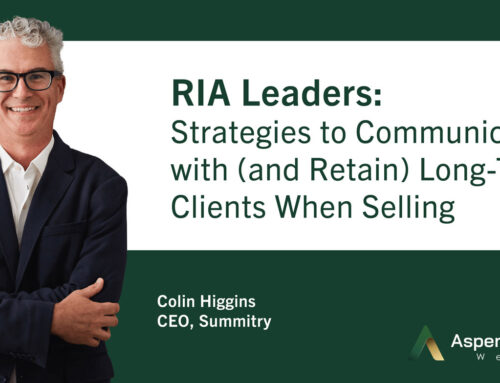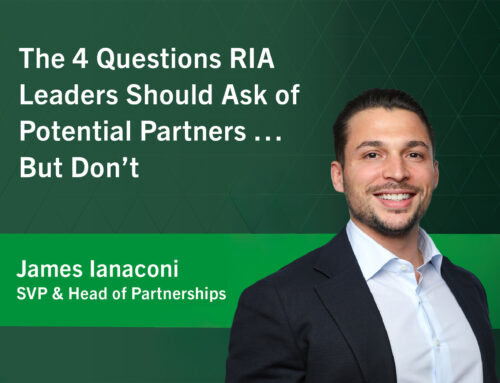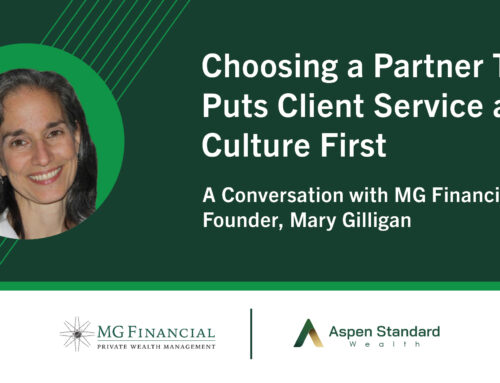By Richard C. Sarhaddi, Esq., General Counsel and Chief Compliance Officer, Aspen Standard Wealth, LLC
Compliance.
For RIA leaders, it’s typically an area of their business they would prefer to focus least on, but also a function that is absolutely critical for their firm’s success. And for many leaders, the title and responsibilities of Chief Compliance Officer (CCO) falls on them, much to their chagrin. The responsibilities of a CCO are time-consuming and complex to say the least. They must be tackled with great care and attention, not only because the CCO role is mandated by the SEC, but because a successful compliance regime mitigates risk to the firm and helps to ensure the safety of client assets. Neglecting compliance can even expose the CCO to personal liability and subject the firm to SEC fines or even a business suspension. However, as a firm grows, it inevitably becomes unsustainable for an RIA leader to manage all of the responsibilities required of a CCO.
So, it should come as no surprise that when founders eventually look to partner with other firms, access to a centralized compliance function is typically at the top of their wish list. A partner’s compliance offering can allow RIA leaders to do what they do best—manage their clients’ assets and grow their business.
If you are in this situation, below are nine key capabilities to look for in a partner’s compliance offering to ensure that the day-to-day compliance work can be taken “off your plate,” with the assurance that your program is being administered properly and meets regulatory obligations.
- Prioritization of Compliance. Look for a partner that takes compliance seriously, from the CEO down, and ensures your compliance function and CCO are fully supported and empowered to effectively manage risk and adapt to any new rules, regulations and provide guidance impacting your business. Compliance should never be an afterthought. It should be at the top of your and your partner firm’s priorities and be adequately resourced.
- Policies and Procedures. A potential partner should have expertise in developing a robust compliance program and be able to assist you with reviewing your policies and procedures, at least annually, in response to new rules, regulations, guidance and/or business lines. A compliance program is not something that just “sits on the shelf,” but is rather a living, breathing function that requires constant monitoring and evolution.
- Risk Assessment. Your partner should have the capability to work with you on developing a comprehensive risk assessment, which should be conducted annually and updated as needed in response to any new or emerging risks encountered by your firm. Every likely scenario should be played out to ensure risks are identified, documented and mitigated or, if possible, eliminated.
- Ongoing Monitoring and Testing. Any firm you are considering partnering with should have the capability to ensure your compliance program and applicable controls are monitored and tested on an ongoing basis.
- Marketing Review. Make sure any potential partners fully understand the SEC’s new Marketing Rule and can provide support in reviewing your marketing materials. This is critical in evolving your firm’s growth plan in a fully compliant manner.
- Training. The right partner will invest in robust training for your employees to help ensure that they understand your firm’s policies and procedures and the underlying rules that are applicable to your firm—as well as provide the necessary continuing education. Moreover, they should do so in a way that is tailored to your firm’s specific business needs.
- Regulatory Change Management. A partner that can provide a regulatory change management program is critical to help ensure ongoing compliance with the ever-evolving regulatory landscape. That includes proactively identifying, assessing, and implementing updates to your firm’s compliance program and operations. This can be a very time-consuming process. A partner that offers this service can help you and your team focus on your clients and your firm’s growth.
- Vendor Due Diligence. A potential partner must be able to assist with conducting due diligence on external vendors and service providers through the lens of compliance requirements. This often ends up saving so much time and money in the long run.
- Ongoing Advisory/Consulting. Finally, the right partner will have an “open-door” policy on all things related to compliance and should be ready and willing to provide ongoing consultation on day-to-day compliance matters. A culture of compliance truly sets the groundwork for sustainable growth, enduring client trust, and resilience under regulatory scrutiny.
Contact Aspen to learn how we support our RIA partners in managing their compliance function.




